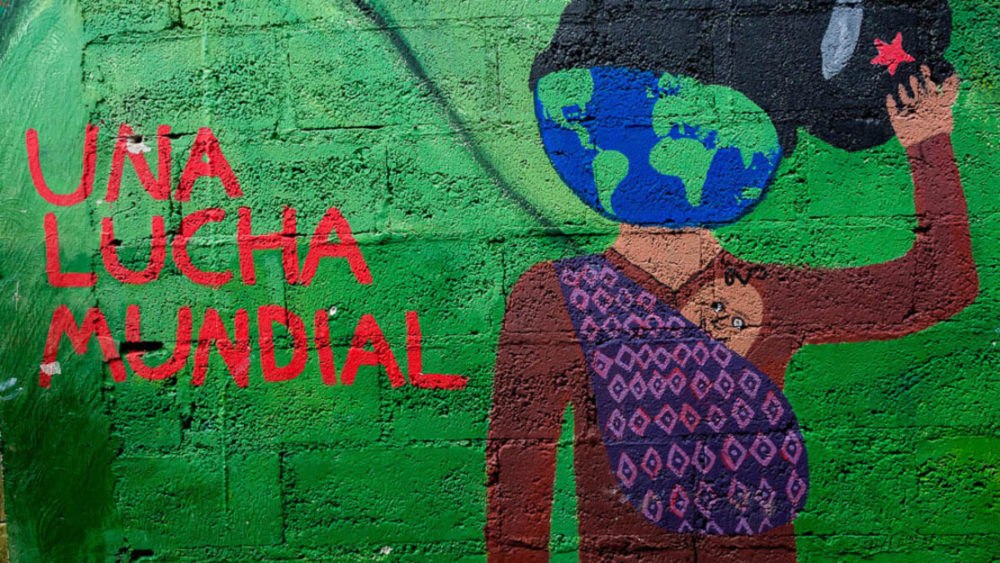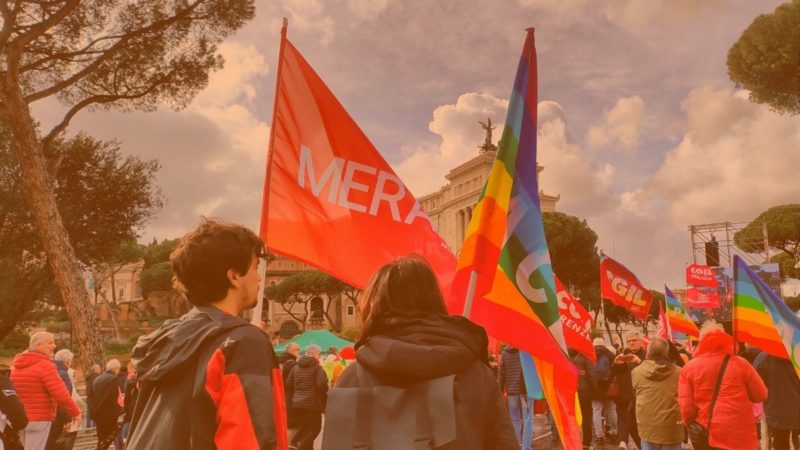Hermanoas (word including all genders, made of hermanos/hermanas = sisters/brothers), sisters and brothers:
Comrades (male and female), compañeroas (word including all genders, made from compañeros/compañeras):
We received with pleasure your invitation so that, within the framework of the Zapatista Journey For Life, we may meet, talk and listen to each other about our histories, our dreams and nightmares, our rages and our struggles.
We know well that what we are proposing is not someone else’s fight. It is not a fight that should support and offer solidarity. No. It’s everyone’s own fight. By each in their own geography and by each according to their own calendar. Intrinsically each one puts up that fight. We should not stand doing nothing, watching misfortunes happening, listening to injustices and crimes, with resignation and conformity.
We well know that, among all the near and far laments, there is a tremor that cracks open the whole world: the sob of the earth. And not the earth as the dust, the color that we are, but everything: the valleys and mountains, the wind, the waters, the plants, the animals, the people. But the earth does not resign itself, it also resists, it rebels against that death.
And then we understand that it is not that the earth is sobbing, but that it is calling to us. And it calls for us to fight against death, to fight for life.
Then we, Zapatistas, are so pleased that we are going to discuss this matter in person. And, yes, about other matters as well. But above all about this, our fight, yours and ours.
So we write to you to tell you that we accept as an honour your invitation. And to be thorough, we ask of you the following:
The most important thing is, as you must know, that this fight is bigger than each one of us. It is not a matter of nationality, colour, sexual and/or social identity, language, culture, belief or disbelief, political and ideological position, individual or collective history. It is a matter of humanity. And we also know, however, that not everyone is willing to face this fight.
And we know that a fistful of capitalist criminals are the judges and the executioners of this war against humanity. They are few, yes. But even if there were many, even if they were the majority, we do not fight to be popular and have lots of applause, followers, likes or high percentages in the polls.
No, we fight and we will fight because it is our duty, because somehow we feel in our guts (or as each may name their heart) that it is not right like this, that it is not good for anyone: the violence against women, the destruction of nature, the persecution of differences, the exploitation of people, the contempt for the other, the thievery disguised as legality, the sentencing to slavery and death of children, the arrogance of those who have it all and hide that they have it only because they despised, stole, looted, exploited, persecuted, imprisoned, disappeared, raped and murdered under different flags, national, religious, racial, of language, ideological, cultural, sexual, whatever the Bosses can come up with.
And, although our struggles are different, distinct, and even contradictory and contrary, at least we Zapatistas want to know, to learn from you. Suddenly, who knows, it may be, both mutually, your struggle and ours, we discover that between so many and too many differences, distances and contradictions, we have something in common.
We Zapatistas put it like this: there is a “NO”. Sometimes individual, sometimes collective. Sometimes recent, sometimes already past several calendars. With the voice and the silence of each one, with our fists and teeth, with the rage that raises us even in the seemingly most definitive defeat, we say “NO!”. That “NO!”, we Zapatistas call “rebellion.” We rebel against the powerful, against their violence, their lies, their destruction, the death they plant across the planet.
But that “NO!” sometimes just stays there. That is, in survival mode. Not to die. Not to stop being what we choose to be. But it then happens that someone asks us if there is only that No!”. If everything just stays there, in a “let’s see who wins”: they (the masculine, because although some are female, the entire system is patriarchal) seeking to destroy us, annihilate us, erase us; and we, resisting so that they not destroy us, so that they not annihilate us, so that they not erase us from the world and from history.
And it may be that the someone who asks us this, is our own heart, individual or collective. And then, in trying to answer, we start looking for the how, the when, the with what and with whom. This is what we here call “resistance”. That is, to search and to build another path, another thing, another world. And then we see that they come together, that the resistance and the rebellion are joined together.
For example, we Zapatistas, what is it we do with this trip? Well, we rebel against a history that is, moreover, imposed on us as our destiny. And we then want to make another history, together, collectively, finding and learning from many paths, many rebellions and resistances. And what if we find out it’s the same? Ah, right?
But what if not, what if it is not the same, what if it is different, distant, distinct, contrary, and has nothing in common with ours? What are we going to do? Get discouraged? Get angry with those who are different? Try to convince them that they are the same as us? Force them? Impose on them our thinking, ways, tactics and strategy, by reason or by force? Try to convince them by the good way or the bad? That they surrender? That they sell themselves? That they give up?
And that one which wants everyone to think and do the same is called homogenizing. And when a thought, mode, calendar, geography is imposed on everything, it is called hegemony. Yes, we know that those words not only mean that, but we take those words like that. If you want, before you correct us and throw us a roll of semantics, use the word “domination”: the man of the woman, the hetero of the different, the white of the black, the employer of the employee, the etcetera of the other etcetera.
And so we think about it: What if what seems to be a weakness, is actually a fortress? What if that which makes our struggles different (its calendar, its geography, its way, its step, its company, its route, its destination) is what unhinges the beast? We know that they tell us “divide and conquer”, but it is not that our struggles are divided, but that they are different. We also know that they do not tell us that behind “unity is strength”, what stands is “in the union there are those who command and those who obey.”
So what do we, Zapatistas that we are, propose? None of that. Neither the division nor the union. We propose to talk, to listen. Perhaps more can be reached, an agreement. Or maybe not. Perhaps we listen with attention and respect and, in the end, we say goodbye with a: “well yes, I learned that you are more of an idiot than I thought”; or with a “well, I have learnt what we should not do”; or a “I thought I was wrong, but after that I realized that there are others who are worse”.
Well, herman@s (siblings), compañer@s (comrades), you will wonder what all this stuff is about, since what you want to know is how many of us will arrive and when. Well, for sure we are telling you that we are going to talk with whoever invites us to talk, that is, to talk and listen. And it is more than probable that we talk with people who are not only different from you, but who are also opponents and even current or past enemies. And it is more than likely that you will get annoyed and angry about why we talk to such and such since they are such and such, who etcetera.
So we don’t want you to be fooled into thinking or believing that we are only going to talk to those who think and act the same as you. We say it clearly: we go with whoever invites us (of course, if we have the right money, time, health). If this is a problem for you, if you put a condition to your invitation that we should only meet with those that you approve of, just say it and there is no problem. Likewise, if it is true that we are fighters, well, we will meet in the fight. So you can withdraw the invitation or ask us to decline. So we would say that we are honoured by your invitation, but we can’t accept it. Or whatever is done in those cases. The point is that we are not going to judge and condemn any struggles; we will learn about yours and, if you want, you can learn about ours.
And what is certain is that we are not going to impose a way of seeing the world, a method of struggle, a thought, a way. That would be trying to conquer you, and that, as your own struggle says, is not possible because you revolt and resist, or whatever you name your struggles. If you could be conquered, you would not have invited us.
That said, we ask from you:
- To tell us how many Zapatistas you can receive, host and provide food for. Preferably we want to be together, that is, in the same place. This is not only because families will travel together, but also because we support each other, for example in the language, and some of us only use our native language: that one of Mayan origin. For those who are not couples, please separate Zapatista women, Zapatista others (otroas: word for others including all genders) and Zapatista men.
- Which dates suit you best or is there no limitation for you regarding the time of our visit. That is to say something like: “we want you to come on that day, at that hour and that you leave on that date “, or ” you can come whenever you want and whenever you can and you will be welcome here”. Be careful: open date invitations are preferable, but do not exclude those of a precise date. For example: reindeers do not belong in the open calendar category, but they have their own time.
- If you can transfer the above number of Zapatistas (that you can host) from one point of the European Union to your place (geography) and back. We need this in order to find out if we can afford it.
- If you can support the return to our place (geography) because we do not want to stay and live in the places we will visit.
- If you are part of a geographic union or whatever this is called. And if the response to these issues is from the entire union or from a group, collective, town, assembly, organization, movement, or as each one is called.
- If you have activities to propose to participate in. Separating on the one hand those that are meetings for discussion, talking and listening, and on the other hand those which belong in the category of larger meetings, marches, festivals, round tables, interviews, rallies, etc., meaning those that go beyond your group.
- If any or all of the activities you propose have any special characteristics. For example: a meeting of women fighters. We would not even think of sending men to such a meeting, but if you think it is necessary to specify it, do it: “no males are allowed … no beetles. Cats-dogs yes, previous hormonal analysis ”. Just take into account that some comrades go with their babies and some are males, although they are not more than 10 years old. Another example?: “people over 99 years old are not allowed without permission in writing from their parents or guardians ”.
- If you propose some “extra” activities. For example: we are not interested in the “history” of the above (those in power) that venerates itself or monuments where Power boasts, although we are interested in culture and art. We would prefer a tour through the streets and neighbourhoods where freedom confronts fascism in its different meanings, community and union assemblies, neighbourhoods and factories, migrant camps, meet native peoples, efforts-initiatives in defense of nature, the struggles against megaprojects and against all kinds of impositions in the name or not of “progress” and “civilization”, and everything that has to do with Europe of below (peoples), instead of the “palaces” of kings, the “malls” and the European disneys. Do not discard concerts, festivals, theatre, arts exhibitions, dance and, of course, football games (Although do not be surprised if the delegation celebrates plays and goals regardless of whether they are from the opposing team to the hosts – don’t worry, just tell the misguided: “those are the damn enemies”, so that they change the cheers for boos-. Sure, insulting the referee is the best in those cases, that is something universal and has nothing to do with football -philias and -phobias).
- Take Note: in the case of women’s sports matches (there is at least one soccer match already agreed in Hamburg, Germany), it is expected that the Europe of below will support the Zapatista team in an unconditional, massive, sonorous, festive and forceful way. Even if we usually lose on the field of play, a defeat in the stands would be regrettable. Think about the return of the comrades and their anecdotes: interviewed on their return by the Tercias comrades, there is a big difference between the “we lost 7 to 0”, and the “it was very nice, there were many comrades from there shouting and making noise”. In this case, if the interviewer from the Tercia (third) insists on knowing the final score, it is to be expected that the Zapatista player will respond with a “how can I remember?”, and she elaborates on a description of the stands, their colours, their sounds and she concludes with something like “those comrades speak very differently, but they are very happy.”
- If you can provide a back and forth translation. This means, to be able to translate in your language what we say and to be able to have your words translated to us.
- If there are any tips in order to attend an activity. For example: “balaclava of etiquette”, “casual clothing”, “beetles without armour or sharp weapons”. Or things which people will choose or exclude.
- If you have any questions. Of course, it should not be an interview disguised as a question, or existential questions, personal or private.
- If you know of any person, group, collective, indigenous people, movement, organization or anything similar that are sad because they did not manage to send their invitation, tell them there is no problem. As many, too many have arrived, we have not finished reading all of them, so a few more can be sneaked in without problem. Deadline: 12 April 2021 at 2400 Mexico time.
Don’t worry about the dates of the visits and about the activities (if they are not before July 2021), because, although we can only spend 3 months in European geography, we can organize ourselves to arrive in shifts. That is, it can be throughout the second semester of 2021 or even in 2022.
We remind you that the first group of the invasion would arrive by sea in the second half of June 2021 and it is small, symbolic. Accomplished that beachhead, starting from the first week of July more and more Zapatistas will arrive in waves in European lands, according to the invitations that are accepted and, of course, according to our budget.
Finally, we insist that, although we are not closed to massive activities, rallies, marches, etc. (we even consider that some are and will be desirable and necessary), our main objective is meetings with people, groups, collectives, villages, native peoples, assemblies, movements, organizations. In general, wherever people can speak and listen.
For this reason, we ask you to put special emphasis on these types of meetings. With you and with those you fight together with.
Well that’s all for now, comrades (compañeroas, compañeras, compañeros), siblings, friends and enemies.
See you soon.
Click here to read our message welcoming the Zapatistas in Europe.
Do you want to be informed of DiEM25's actions? Sign up here




